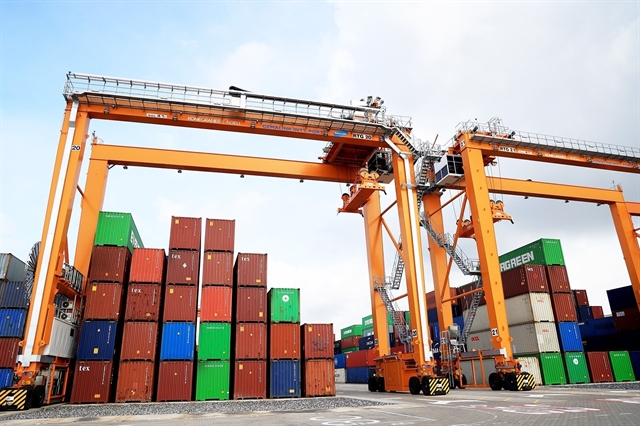 |
| Containers at Gemalink Port, Bà Rịa – Vũng Tàu. Several shipping companies have announced higher costs for goods transportation to the US, the EU and other countries from January 2024. — VNA/VNS Photo Hồng Đạt |
HÀ NỘI — Vietnamese exporters are worried about rising transportation fees as the tension in the Red Sea forces shipping lines to divert their routes to ensure safety.
This adds a burden on exporters which have been already suffering from a global economic slowdown in 2023, said Trương Đình Hoè, general secretary of the Việt Nam Association of Seafood Exporters and Producers (VASEP).
A number of shipping companies have announced higher costs for goods transportation to the US, the EU and other countries from January 2024, citing Red Sea tensions stirred by the recent attacks by Yemen’s Houthi rebels on commercial ships affecting the safety of many routes and forcing them to divert, which has subsequently led to longer delivery and higher expenses.
Large shipping firms like Yang Ming Line, One, Evergreen Line, HMM, and Maersk have informed exporters of additional charges as they have to divert Asia-Europe routes away from the Red Sea and the Suez Canal, meaning that the delivery would be up to 10 times longer.
Hòe pointed out that the transport fees to the West Coast of the US increased by around 55-60 per cent to US$2,873 – 2,950 in January compared to the previous month. To the East Coast, the increase is around 58-73 per cent to $4,100-4,500. The transportation fees to Hamburg (Germany) are 3.5 times higher, from $1,200-1,300 to $4,350-4,450.
“Rising transport fees cause difficulties to the export of seafood products to the US and the EU, which will affect the competitiveness and profit of exporters,” Hòe said.
Phạm Minh Thông, chairman of Phúc Sinh Joint Stock Company which ships around five to 10 containers of goods to the EU and the US every day, said that the exports of coffee, pepper and spices are significantly affected. Rising transport fees add burdens on the costs of exporters, especially those of small scale who are already struggling to handle signed contracts.
If prolonged, high transport fees will be a big problem for exporters when the consumption demands in the US and the EU remain low, Thông said.
Phạm Thái Bình, chairman of Trung An Hi-Tech Farming Joint Stock Company, said the rising transport cost would burden the entire industry chain, meaning that it would affect both sellers and buyers.
According to Shinhan Securities Việt Nam, Vietnamese firms exporting to Europe and North America’s East Coast are being affected by Red Sea route changes.
Seafood and textile companies will experience minimal impact, with their transport costs accounting for less than 5 per cent of the total operational ones.
Meanwhile, the turmoil in the Red Sea – a crucial maritime route connecting the Mediterranean to the Indian Ocean facilitating trade flows from Europe to Asia – has led to a significant increase in transport fees, benefiting maritime transport businesses in the short term.
The ongoing tension in the area also supports an upward trajectory in oil prices, which has a positive impact on upstream, oil refining, and oil transport companies.
Trần Thanh Hải, deputy director of the Foreign Trade Agency at the Ministry of Industry and Trade (MoIT), said the Red Sea tension could raise the shipping cost and the commodities hit hardest include textiles-garments, footwear, wood products, and electronic devices.
Therefore, the exporters using long routes need to take timely response measures to avoid losses, he said.
To protect their interests, the MoIT has urged businesses and logistics associations to keep a closer watch on the situation so that their members stay updated with developments to ready production, export, and import plans to avoid adverse impacts.
They were also recommended to discuss with partners to extend goods preparation and delivery time if necessary, diversify supply sources to minimise the impact on supply chains, and consider rail transport to have more transportation choices, Hải noted.
In particular, the MoIT advised businesses to include articles on compensation and liability exemption in emergency cases when negotiating and signing trade and transport contracts. They were also advised to buy insurance in anticipation of risks and losses during prolonged transportation or unexpected incidents, and ready different transportation plans.
The Suez Canal connects the Red Sea to the Mediterranean and serves as the fastest route for transporting fuel, food and consumer goods from Asia and the Middle East to Europe, which handles about one-third of the global cargo. — VNS
- Reduce Hair Loss with PURA D’OR Gold Label Shampoo
- Castor Oil Has Made a “Huge” Difference With Hair and Brow Growth
- Excessive hair loss in men: Signs of illness that cannot be subjective
- Dịch Vụ SEO Website ở Los Angeles, CA: đưa trang web doanh nghiệp bạn lên top Google
- Nails Salon Sierra Madre
 VnExpress News The News Gateway of Vietnam
VnExpress News The News Gateway of Vietnam




